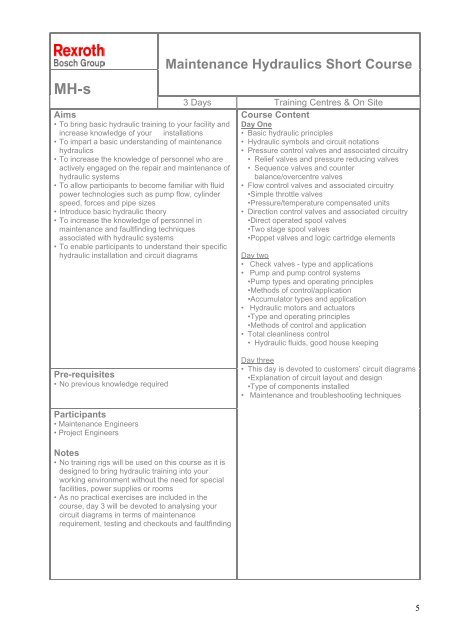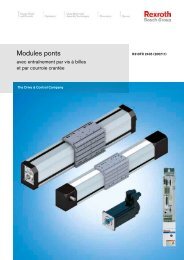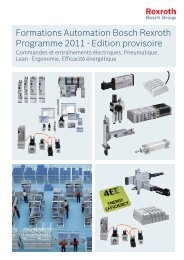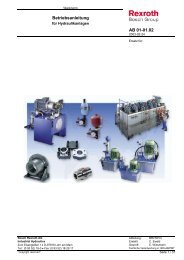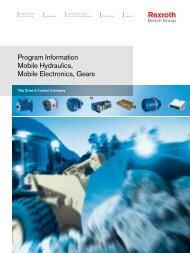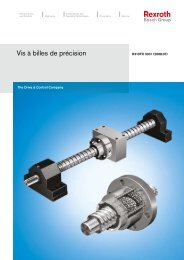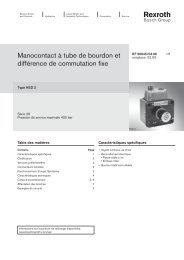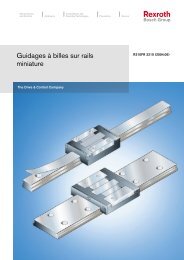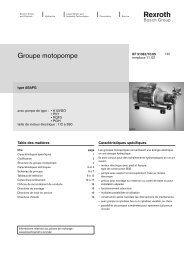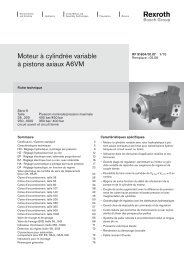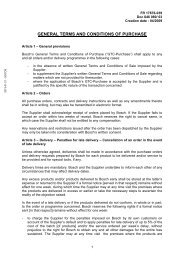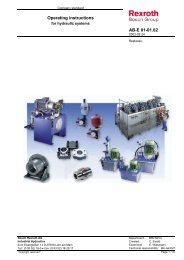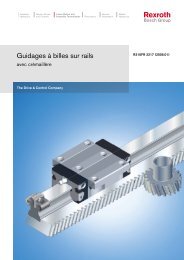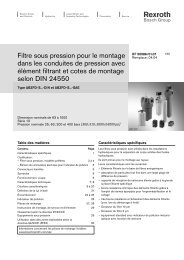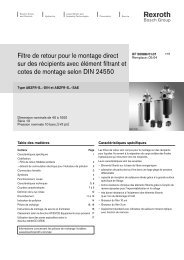Download here the Hydraulic Training Course ... - Bosch Rexroth
Download here the Hydraulic Training Course ... - Bosch Rexroth
Download here the Hydraulic Training Course ... - Bosch Rexroth
Create successful ePaper yourself
Turn your PDF publications into a flip-book with our unique Google optimized e-Paper software.
MH-s<br />
Maintenance <strong>Hydraulic</strong>s Short <strong>Course</strong><br />
3 Days <strong>Training</strong> Centres & On Site<br />
Aims<br />
• To bring basic hydraulic training to your facility and<br />
<strong>Course</strong> Content<br />
Day One<br />
increase knowledge of your installations<br />
• Basic hydraulic principles<br />
• To impart a basic understanding of maintenance<br />
hydraulics<br />
• To increase <strong>the</strong> knowledge of personnel who are<br />
actively engaged on <strong>the</strong> repair and maintenance of<br />
hydraulic systems<br />
• To allow participants to become familiar with fluid<br />
power technologies such as pump flow, cylinder<br />
speed, forces and pipe sizes<br />
• Introduce basic hydraulic <strong>the</strong>ory<br />
• To increase <strong>the</strong> knowledge of personnel in<br />
maintenance and faultfinding techniques<br />
associated with hydraulic systems<br />
• <strong>Hydraulic</strong> symbols and circuit notations<br />
• Pressure control valves and associated circuitry<br />
• Relief valves and pressure reducing valves<br />
• Sequence valves and counter<br />
balance/overcentre valves<br />
• Flow control valves and associated circuitry<br />
•Simple throttle valves<br />
•Pressure/temperature compensated units<br />
• Direction control valves and associated circuitry<br />
•Direct operated spool valves<br />
•Two stage spool valves<br />
•Poppet valves and logic cartridge elements<br />
• To enable participants to understand <strong>the</strong>ir specific<br />
hydraulic installation and circuit diagrams<br />
Day two<br />
• Check valves - type and applications<br />
• Pump and pump control systems<br />
•Pump types and operating principles<br />
•Methods of control/application<br />
•Accumulator types and application<br />
• <strong>Hydraulic</strong> motors and actuators<br />
•Type and operating principles<br />
•Methods of control and application<br />
• Total cleanliness control<br />
• <strong>Hydraulic</strong> fluids, good house keeping<br />
Pre-requisites<br />
• No previous knowledge required<br />
Day three<br />
• This day is devoted to customers’ circuit diagrams<br />
•Explanation of circuit layout and design<br />
•Type of components installed<br />
• Maintenance and troubleshooting techniques<br />
Participants<br />
• Maintenance Engineers<br />
• Project Engineers<br />
Notes<br />
• No training rigs will be used on this course as it is<br />
designed to bring hydraulic training into your<br />
working environment without <strong>the</strong> need for special<br />
facilities, power supplies or rooms<br />
• As no practical exercises are included in <strong>the</strong><br />
course, day 3 will be devoted to analysing your<br />
circuit diagrams in terms of maintenance<br />
requirement, testing and checkouts and faultfinding<br />
5


